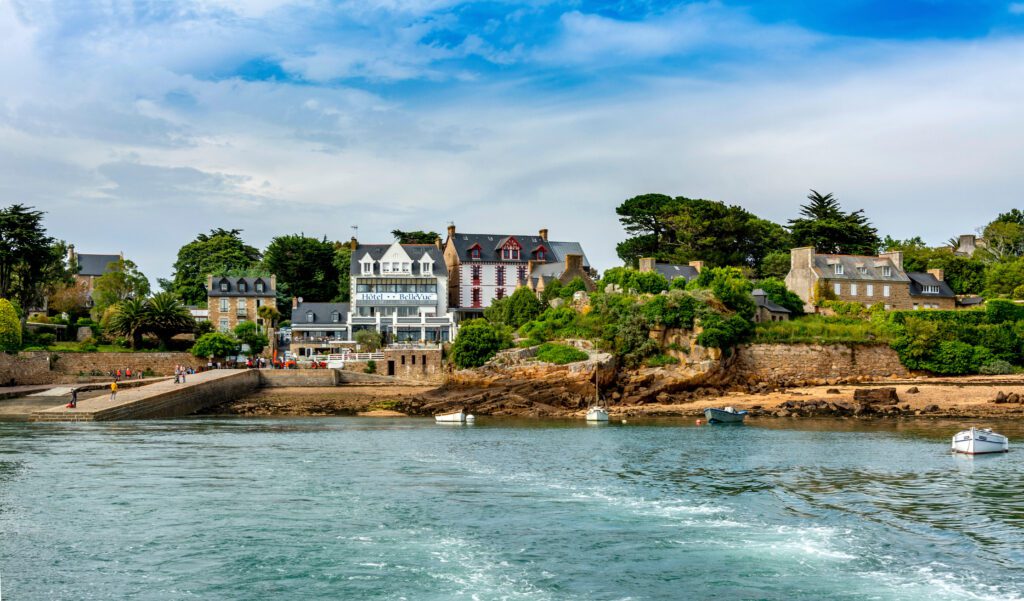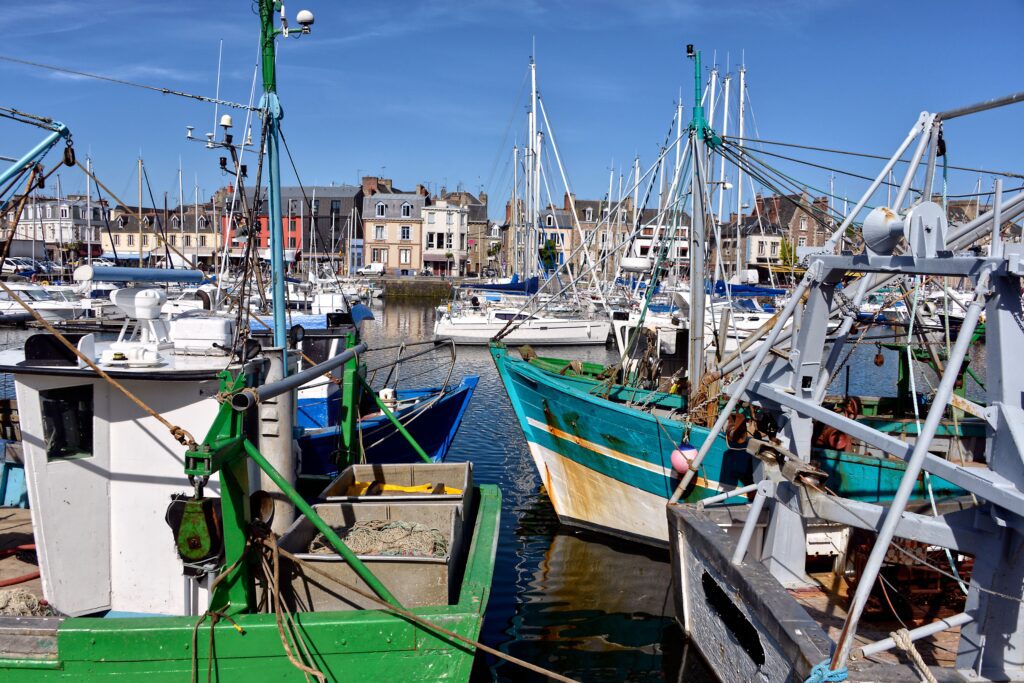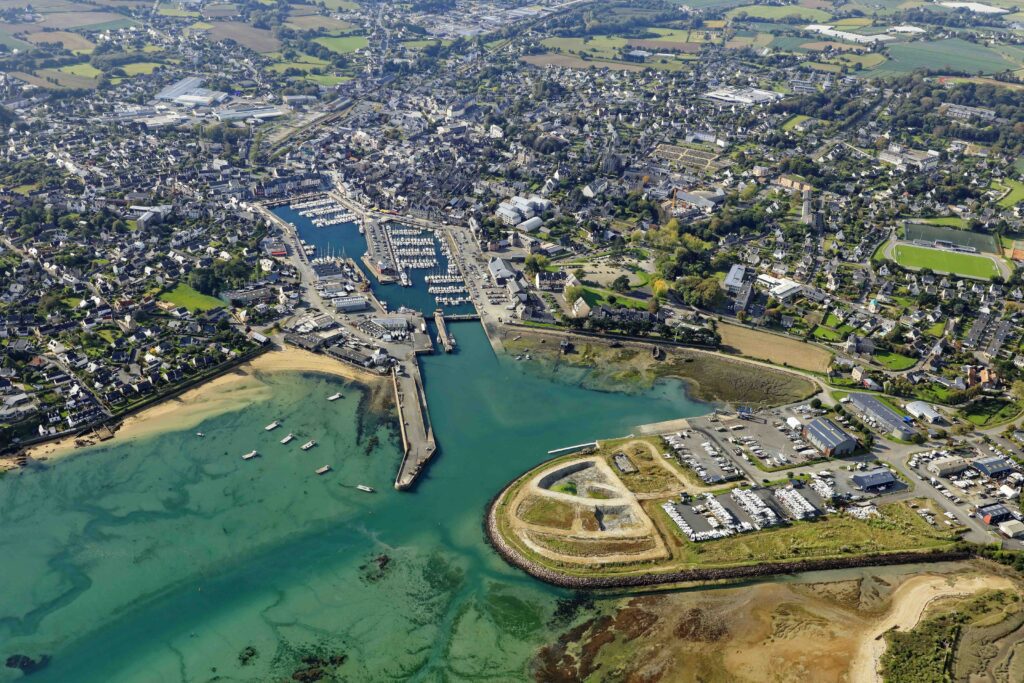Publication date: 01/03/2024
A port in Paimpol since the 18th century
The earliest traces of Paimpol's harbor date back to before 1800: the second half of the 18th century marked the start of construction work on a harbor, which then only had a basin. The town of Paimpol was booming, and this opening onto the English Channel was undoubtedly an asset for its development.
In the 19th century, Paimpol's territory underwent considerable change, with the town's surface area increasing: Paimpol's main pond was partly drained and reclaimed, the Quinic river was diverted from its bed, and several jetties were built... As the town expanded, the wet dock in Paimpol harbor was surrounded by quays. These were later lengthened and reinforced, and a jetty was added.
At the end of the 1800s, in addition to port buildings, the port of Paimpol also boasted technical expertise: several shipyards, for example, were able to build and repair boats.
Construction of a second wet dock for the port of Paimpol was completed at the beginning of the 20th century. Following on from previous developments, the town continued to buildport facilities to support maritime activities. These included an inclined slipway, warehouses, several steam cranes...
At the heart of Paimpol's history, cod fishing
Although Paimpol has been referred to as a port since the 18th century, traces of maritime activity can be traced back much further. For example, Paimpol was already a port for privateers during the Hundred Years' War! But what really marked the town's history was cod fishing: for hundreds of years, Paimpol's inhabitants hunted this fish, first on the banks of Newfoundland and then around Iceland.
By the 16th century, there were already a few cod-fishing boats on the water. But it was in the mid-19th century, from 1852 onwards, that the activity really took off. The first shipowner, Louis Morand, sent out his first cod schooner from the port of Paimpol. The results were conclusive, and in the following years he launched three more vessels...
From 1852 to 1895, fishing activities continued to develop in the port of Paimpol. The number of shipowners multiplied, to the point where we now speak of a fleet of around one hundred boats leaving the Breton town each year on fishing expeditions. Aboard these vessels, fishermen from Paimpol head for the coasts of Iceland, for a six-month period.
More than 2,000 sailors were killed in the fishing industry before it came to an end in 1935. In addition to the dangers encountered at sea, poor living conditions were blamed. In particular: malnutrition, hygiene problems, and a lot of alcohol on board.
The port of Paimpol today
Even today, the town known as the Cité des Islandais remains linked to the sea. The end of the cod-fishing era did not, however, mark the end of Paimpol's port! The port has adapted to changing uses, making possible a new way of enjoying the sea: yachting.
Today, the port of Paimpol is one of the main ports in the Côtes d'Armor department. It still plays a major role in fishing activities in the Channel area. But every year, it is also frequented by many pleasure boaters.
And with good reason: on the Emerald Coast, Paimpol is a port that opens onto an exceptional sailing basin. To the west, Perros-Guirec, the archipelago of seven islands, Carantec, Roscoff and the Isle of Batz... To the east, Saint-Quay-Portrieux, the Bay of Saint-Brieuc, Saint-Malo... From here, sailors can take advantage of numerous particularly pleasant and easily accessible destinations.
Less than five nautical miles from the Paimpol marina, theisland of Bréhat is a must-see: just five square kilometers in size, it boasts many points of interest, including a tide mill, two lighthouses and a number of religious monuments, making it a refreshing stopover. The island's microclimate is conducive to the development of an impressive diversity of flowers and exotic plants, and the landscapes and beaches are very pleasant. As you can see, there's plenty to discover on your visit to the island!

With its landscapes between sea and estuary, its coastline of beaches, rocks and cliffs, and its emblematic monuments, the town of Paimpol itself invites yachtsmen to many natural and cultural discoveries. The town's port history is recounted at the Musée de la Mer.
Today, as in many other Breton ports of call, the port of Paimpol is also ideal for gastronomic discoveries. This can be achieved by sampling local oysters, for example, at the town's weekly market.
Last but not least, a number of festivities regularly highlight the region and its history. Sailors, for example, can enjoy the Fête des Islandais - held every year in July - or the Festival du Chant de Marin de Paimpol - held every two years in August.

Paimpol marina, a popular port of call
As a nautical destination par excellence, the town of Paimpol naturally boasts a top-quality marina. With Port Adhoc Paimpol, sailors now benefit from a dry port in the English Channel, perfectly adapted to current and future uses.
Located both in the heart of the town and outside the floating harbour, Port Adhoc Paimpol gives crewsaccess to all facilities, without having to use the locks. This saves users between 45 minutes and two hours' sailing each time.
On site, boat owners have access to 240 dry berths on racks, private pontoons and water and electricity terminals. The port's infrastructure and staff enable vessels up to 8.50 meters in length to be launched and taken out of the water every day of the year, according to tide times.
Last but not least, this harbor is particularly well-suited to pleasure boating, offering a wide range of services: a fuel pump, an outfitting store, a sailmaker, a yacht club, a boat rental agency, a driving school and a sailing school, a broker, a shipyard offering maintenance, repair and winterization services...
Would you like to discover our dry port in the English Channel on your own, with your own unit? Contact our team today, and let's plan your next visit to Port Adhoc Paimpol!
